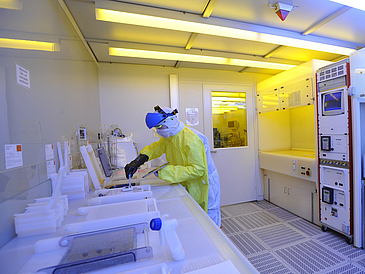Sensor technology monitors the wear and tear on aircraft and wind generators, enhances the safety of robotic systems and provides more scope of action for robots: just three examples of applications connected with research carried out by the Central Research Unit “Integrated Solutions in Sensorial Structure Engineering“ (ISIS) at the University of Bremen. Following successful completion of a two-year probationary period, the University’s Academic Council has now passed a resolution to install the central research unit on a more permanent basis. Professor Matthias Busse (Faculty of Production Engineering / Fraunhofer Institut für Fertigungstechnik und Angewandte MaterialforschungIFAM) will act as Chairman of the Management Board, assisted by Professor Walter Lang (Faculty of Physics/ Electrical Engineering) and Professor Hans-Werner Zoch (Faculty of Production Engineering / Institut für Werkstofftechnik IWT).
Research on sensor technology is of pivotal importance for the advancement of global technological development. Among other things, it involves the evaluation of sensor data, as well as how to use the information subsequently made available in order to improve the efficient control of engineering products, making them safer and at the same time delivering the basic requirements for autonomous action. Since 1998 the global market for sensors alone has risen from $ 32.5 billion to an estimated $ 66 billion in 2010. This dynamic development is mainly attributable to the diversity and flexibility of the underlying engineering technologies which, in addition to providing possibilities for optimizing existing solutions, also open up a broad spectrum of new opportunities. Take entertainment electronics, for instance: a modern smart phone contains a whole range of sensors connected with movement, position, light and pressure functions which are nowadays quite commonplace. Similarly in automobiles: the number of sensors and functions which contribute to our safety and comfort is increasing all the time.
The University of Bremen is determined to play a leading role in this ever more important field of research. A special feature of the research work carried out in Bremen is the traditional interdisciplinary interplay between the research fields of production engineering and materials science, as well as cooperation in the natural sciences and computer science. This interdisciplinary cooperation will now receive a considerable boost from the visionary decision to develop research in the area of sensor materials: this is the task of the ISIS central research unit. The research unit‘s interdisciplinary organizational form brings together experts in the fields of production engineering, physics/electronics, biology/chemistry and mathematics/computer science. In addition to this, the ISIS will also receive support from renowned extra-mural research institutes. These associated members include the Fraunhofer Institut für Fertigungstechnik und Angewandte Materialforschung IFAM, the Bremer Institut für angewandte Strahltechnik (BIAS) GmbH, the Faserinstitut Bremen (FIBRE) e.V., the Stiftung Institut für Werkstofftechnik (IWT) and the Deutsche Forschungszentrum für Künstliche Intelligenz (DFKI) GmbH.
Further information can be obtained from Dr.-Ing. Dirk Lehmhus at the central research unit “Integrated Solutions in Sensorial Structure Engineering“, e-mail dirk.lehmhusprotect me ?!uni-bremenprotect me ?!.de and on the Internet at www.isis.uni-bremen.de.

